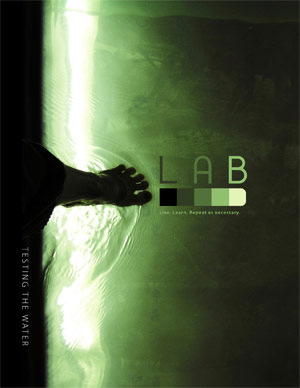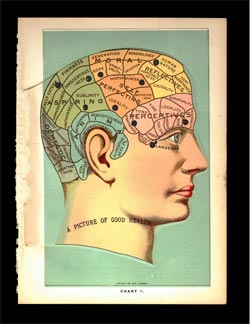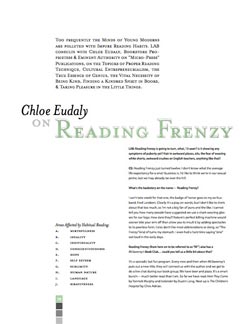Too frequently the Minds of Young Moderns are polluted with Impure Reading Habits. LAB consults with Chloe Eudaly, Bookstore Proprietess & Eminent Authority on “Micro-Press” Publications, on the Topicks of Proper Reading Technique, Cultural Entrepreneurialism, the True Essence of Genius, the Vital Necessity of Being Kind, Finding a Kindred Spirit in Books, & Taking Pleasure in the Little Things.
LAB: Reading Frenzy is going to turn, what, 13 soon? Is it showing any symptoms of puberty yet? Hair in awkward places, zits, the fear of wearing white shorts, awkward crushes on English teachers, anything like that?
CE: Reading Frenzy just turned twelve. I don’t know what the average life expectancy for a small business is. I’d like to think we’re in our sexual prime, but we may already be over the hill.
What’s the backstory on the name— Reading Frenzy?
I can’t take credit for that one, the badge of honor goes to my ex-husband, Fred Landeen. Clearly it’s a play on words, but I don’t like to think about that too much, as I’m not a big fan of puns and the like. I cannot tell you how many people have suggested we use a shark wearing glasses for our logo. How dare they?! Nature’s perfect killing machine would sooner bite your arm off than allow you to insult it by adding spectacles to its peerless form. I also don’t like most abbreviations or slang, so “The Frenzy” kind of turns my stomach. I even had a hard time saying “zine” out loud in the early days.
Reading Frenzy (from here on to be referred to as “RF”) also has a
McSweeney’s Book Club… could you tell us a little bit about that?
It’s a sporadic but fun program. Every now and then when McSweeney’s puts out a new title, they will connect us with the author and we get to do a live chat during our book group. We have beer and pizza. It’s a smart bunch— much better read than I am. So far we have read Here They Come by Yannick Murphy and Icelander by Dustin Long. Next up is The Children’s Hospital by Chris Adrian.
How did you go about raising startup funds for RF— did you bust open the piggy bank, sell a kidney, work a side job…?
RF was launched on a shoestring and is held together by charm, charity and chewing gum to this day. A lucky convergence of cheap rent, a car accident, and the heyday of independent publishing made it possible. I don’t think I could do it again if I had to start over today. I worked a second job for the first several months, and I’ve actually just started another job this fall, but that’s another story.
What are some of the jobs/projects you’ve worked on in the past, and how did they influence your decision to open Portland’s Mecca of MicroPress?
I worked for a number of small businesses, primarily retail, including a couple of bookstores, and learned the retail ropes that way. I also contributed to a few local publications, such as Snipehunt and Art Rag in the early 90s, and was totally absorbed in alternative media and underground comics. I was a regular at the X-Ray Café, which I credit as one of the main inspirations behind Reading Frenzy. The X-Ray was the first place I event went and thought, “This place was made for me.” When I think about a lot of pivotal experiences in my youth, I realize many of them centered around creative alternative businesses— The Ooze, 2nd Ave Records, X-Ray, The Howling Frog. I’m a big proponent of the 3rd Place concept— I just don’t want mine to be Starbucks.
What are some of the biggest obstacles RF faces?
Boring stuff like profit margins, the fact that alternative media now has more mainstream outlets— you can buy Bust at the grocery store— which I don’t see as a bad thing, just a challenge when your business is based on the relative unavailability of something. Now that we’ve been around this long, I think it’s easy for customers to take us for granted. I personally can no longer be the “bartender” which has been problematic, as a lot of people come to a space like RF for the personal interaction. There’s also a risk of complacency: sticking with same old or not doing enough outreach because it seems like anyone who would care would’ve heard of it by now.
What does the Magic Eightball say if we ask it about RF’s future?
Magic 8-Ball says “cannot predict now” and “ask again later.”
Any new projects on the horizon?
I started a little publishing outfit called Show & Tell Press last year. I’ve been reissuing Crap Hound by Sean Tejaratchi, and have a number of other publishing projects on the back burner: a RF anthology, a Show & Tell Annual, a few artists’ books, possibly some of my own stuff. I’m also involved in disability advocacy and determined to bring some DIY spirit to that world. I’d like to see zines used in that context not just as a form of creative self-expression, but also as a tool for meaningful communication and self-determination.
What are some of the best/worst parts of being a proprietress?
1. Time management issues
2. Biting off more than I can chew
3. Too many distractions
4.
5.
Oh, sorry. I had to go do something else. Where were we? Look at the time! There is a special thrill in owning your own time and having the ability to turn nothingness into somethingness. That feeling can get the best of you, sometimes you feel like you can do anything. Fortunately, if I don’t eat well and get a good night’s rest, I will rapidly fall apart. So, while I may be having nightmares about unfinished projects, at least I have some kind of default mechanism that keeps me in-check.
How did you become addicted to books?
Unlike most other addictions, reading is good for you! I suppose if you’re spending your rent money on Left Behind (but who needs a roof over their head when the Rapture comes?), that could be a problem. But really, do you know anyone who’s turned to a life of crime to satisfy their book habit (shoplifting books doesn’t count, although that is very bad)? I’ve seen hundreds of books come and go from my personal library over the years. Sometimes I’ve had to sell books to pay my rent. At one point I decided to sell every book that I owned that was available at my local library. I deeply regret that I’ve had to do things like that. A book collection over time can become such an amazing record of your life experiences, passions, whimsies, secrets and mistakes. I am currently creating an online catalog of my books at LibraryThing.com— talk about addictive!
I don’t think there’s anything wrong with being addicted to books. And there’s definitely times when I wish that I’d kept every book I’ve read, instead of perpetually passing them along. Anyway, you probably figured this question was coming at some point: have you read any good books lately?
I recently stumbled upon a livejournal community called What Was That Book? They reunite people with the books they’ve lost, or read a long time ago and have forgotten the title of, as the case may be. I posted about two of my favorite YA novels from the mid-80s and almost immediately got an answer. So, I am currently reading The Rise and Fall of a Teen-age Wacko by Mary Anderson and Mirror of Danger by Pamela Sykes. Next in the reading pile: The Boy Detective Fails by Joe Meno, My Girlfriend Comes to the City and Beats Me Up by Stephen Elliott, and The Sicily Papers by Michelle Orange.
If you could be any typeface, what would you be?
I’m pretty fond of Futura Bold. I’ve actually had dreams about imaginary typefaces, so I would probably have to pick one of my own. Something sturdy and practical, yet given to whimsy and the occasional flourish.
Also, are you a genius?
First of all, I think genius is overrated. You can have all the brains in the world and still be a useless human being. The first step to becoming a genius is reconciling yourself to how completely unfair life can be, that fate and destiny and karma are a load of crap, that one can be good, do good, work hard and ultimately have nothing to show for it (or maybe worse), and in the face of all that you can still find a reason to get up in the morning, take pleasure in little things, be kind to others, and enjoy living. If you have a good idea, faith in your ability, and the wherewithal to see it through, then I say you’re a genius! It’s going to take at least 10–15 years, during which time you will largely feel like an utter failure or at least a total crackpot, and then one day you’ll wake up and realize you did it. Mission accomplished. Genius. I am not a genius yet.
Reminds me of a Bucky Fuller quote: ”I’m not a genius. I’m just a tremendous bundle of experience.” Speaking from experience, are there any resources that you’d recommend for other DIY start-ups?
It’s easier to fill a need than create one. That said, maybe your idea is so brilliant and innovative that no one knew they wanted it until you made it exist! Finding a happy medium is probably your best bet. There wasn’t a single great outlet in Portland for the kind of literature I wanted to represent. I knew there was some demand, and thought through exposure we could create more. Luckily, I was right. I’ve never gotten much out of the SBA, but there are Small Business Development Centers in every state. Portland’s is awesome! I had never taken myself seriously as a business owner until I met my advisor, Jackie. A smart advisor can adapt their knowledge and resources to your project, no matter how unusual it is, and no matter how unconventional it is you have to learn to make money and get to know your industry. It took me years to get comfortable with those two basic facts. There are also some micro-enterprise development projects going on around the country that may be worth checking into; I work with MercyCorps NW [MercyCorpsNW.org]. I sometimes use The Beehive [thebeehive.org]. They provide free online resources for starting and running your own business. I’ve also found various mentors over the years— small or at least independent business owners that I admire who are further down the line than I am. I’ve been a mentor in turn, and I’m happy to try to impart whatever useful knowledge I’ve attained.
In a recent interview on KCRW’s Bookworm, Zadie Smith compared reading to the act of sitting down at a piano and playing a piece of music (written by someone else, aka, the author), with the idea that the greater your talent, the greater enjoyment you’ll get out of the piece. Basically describing reading as more of a participatory process, not just a passive process, like watching TV, where you sit and expect to be entertained.
There is something uniquely fulfilling and beneficial about reading. It’s a solitary pursuit, wholly engaging, but you can take it at your own pace. It’s good for your brain in a way that other mediums are not. The Smith sentiment sounds a little grandiose to me, but I have to admit that not liking to read is a deal-breaker for me— you might as well be from another planet (and a not very interesting one at that). You definitely bring your own experience to a book, and a really good book can give you valuable insight into your own life. Second only to meeting a real life kindred spirit, for me, is discovering an understanding heart through the printed word. There is something so comforting about discovering that someone who lived hundreds of years ago shared the same concerns, sentiments, passions, and pet peeves as you. At the risk of sounding schmaltzy, a good book make me feel less alone in the world. ¤
Top 10 Self-Published Titles (and Authors) Who Will Always Have a Place in My Heart by Chloe Eudaly*
‡
Dishwasher by Pete Jordan
Crap Hound by Sean Tejaratchi
Flatter! by Jaina Davis
Farm Pulp by Greg Hischak
Rubber Whammy by Xtina Lamb
Shark Fear, Shark Awareness by Nicholas Johnson
Bomb the Suburbs by Billy “Upski” Wimsatt
My Evil Twin Publications by Amber Gayle and Stacy Wakefield
Tales of a Punk Rock Nothing by Abram Himelstein and Jamie Schweser
Eskimo by Moorea Jasso



